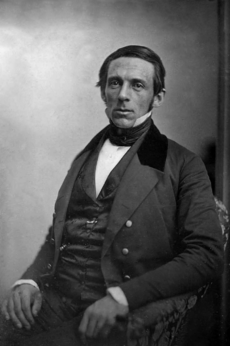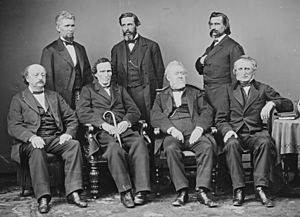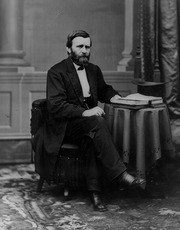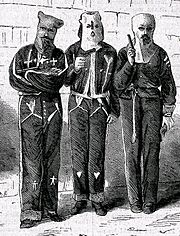George S. Boutwell facts for kids
Quick facts for kids
George Boutwell
|
|
|---|---|
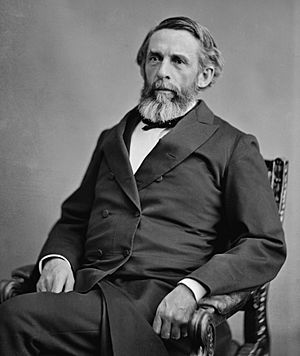 |
|
| United States Senator from Massachusetts |
|
| In office March 17, 1873 – March 3, 1877 |
|
| Preceded by | Henry Wilson |
| Succeeded by | George Hoar |
| 28th United States Secretary of the Treasury | |
| In office March 12, 1869 – March 16, 1873 |
|
| President | Ulysses S. Grant |
| Preceded by | Hugh McCulloch |
| Succeeded by | William Richardson |
| Member of the U.S. House of Representatives from Massachusetts's 7th district |
|
| In office March 4, 1863 – March 12, 1869 |
|
| Preceded by | Daniel W. Gooch |
| Succeeded by | George M. Brooks |
| 1st Commissioner of Internal Revenue | |
| In office July 17, 1862 – March 4, 1863 |
|
| President | Abraham Lincoln |
| Preceded by | position established |
| Succeeded by | Joseph J. Lewis |
| 20th Governor of Massachusetts | |
| In office January 11, 1851 – January 14, 1853 |
|
| Lieutenant | Henry W. Cushman |
| Preceded by | George N. Briggs |
| Succeeded by | John H. Clifford |
| Personal details | |
| Born |
George Sewall Boutwell
January 28, 1818 Brookline, Massachusetts, U.S. |
| Died | February 27, 1905 (aged 87) Groton, Massachusetts, U.S. |
| Political party | Democratic (Before 1855) Republican (1855–1898) |
| Spouse | Sarah Thayer |
| Signature | |
George Sewall Boutwell (born January 28, 1818 – died February 27, 1905) was an important American politician, lawyer, and leader from Massachusetts. He held many key roles in the U.S. government.
Boutwell served as the Secretary of the Treasury for President Ulysses S. Grant. He was also the 20th Governor of Massachusetts. Later, he became a Senator and a Representative for Massachusetts. He was even the first Commissioner of Internal Revenue, which means he helped start the IRS.
He was a strong supporter of ending slavery, known as an abolitionist. He helped create the Republican Party. During the time after the Civil War, called Reconstruction, he fought for African Americans to have citizenship and the right to vote. As a U.S. Representative, he helped create the Fourteenth and Fifteenth Amendments to the U.S. Constitution. These amendments gave rights to formerly enslaved people.
As Secretary of the Treasury, he fixed problems in the department after the American Civil War. He also worked to lower the national debt. He and President Grant stopped a plan to control the gold market in 1869. Later, as a U.S. Senator, Boutwell supported the Civil Rights Act of 1875. This law aimed to protect the rights of Black citizens.
Contents
Early Life and Education
George S. Boutwell was born on January 28, 1818, in Brookline, Massachusetts. He grew up on his family's farm in Lunenburg. He went to public schools until he was seventeen. During summers, he worked on the farm.
He studied math, algebra, geometry, and Latin. From 1835 to 1838, Boutwell worked as a clerk in a store in Groton, Massachusetts. He also started studying law during this time. He didn't become a lawyer right away, but he read and wrote a lot to learn more.
In 1839, Boutwell began his public career. He helped widows of the American Revolutionary War get their pensions. During a trip to Washington D.C., he met a formerly enslaved woman. Her youngest child had been sold away. This experience made Boutwell strongly committed to ending slavery.
Boutwell married Sarah Adelia Thayer in 1841. They had two children, Georgianna and Francis.
Early Political Career (1839–1861)
Boutwell started in politics as a Democrat. He first won an election for the Groton School Committee. He then ran for the state legislature. After a few tries, he won in 1841. He served in the state House from 1841 to 1844 and again from 1847 to 1850.
He became known for carefully researching laws. He supported free trade and more money for education. In 1849, he became a state banking commissioner. This job taught him a lot about money and finance.
Becoming Governor of Massachusetts
By the 1840s, ending slavery was a huge issue in Massachusetts politics. The Free Soil Party grew popular because they opposed slavery spreading into new territories. In 1850, the Fugitive Slave Act made many people angry. This law forced people to return enslaved people who had escaped.
Because of this, the Democrats and Free Soilers decided to work together. They formed a coalition. In 1850, Boutwell won the Democratic nomination for governor. No candidate won a majority of the popular vote. So, the state legislature, which the coalition controlled, chose the governor. Boutwell was elected governor.
During his first term, many reforms were passed. People could now vote by secret ballot. Laws about banks were made simpler. Boutwell also pushed for more taxes to be spent on education, prisons, and mental hospitals.
Forming the Republican Party
After his time as governor, Boutwell continued to study law. He also became secretary of the state Board of Education for five years. In 1855, he helped create the Republican Party in Massachusetts. He urged different groups to unite against slavery. He warned that the country was facing a "period of intense trial" over slavery.
Civil War and Federal Service
In 1861, Boutwell attended a conference in Washington, D.C. This meeting tried to prevent the Civil War. He strongly rejected ideas that would extend slavery. He said the country was "not worth preserving" if it needed slavery to survive.
In July 1862, President Abraham Lincoln appointed Boutwell as the first Commissioner of Internal Revenue. This meant he was in charge of setting up the new Internal Revenue Bureau, which collects taxes. He spent eight months organizing this new department. It quickly became the largest single office in the government.
In 1862, Boutwell decided to run for the United States Congress. He strongly supported freeing enslaved people. He won the election and became a U.S. Representative in March 1863.
U.S. Congressman
As a Congressman, Boutwell became known as a Radical Republican. These Republicans wanted big changes after the Civil War. They believed in strong federal action to protect the rights of African Americans.
Fighting for African American Rights
Boutwell was a strong voice for African American rights. He believed that formerly enslaved people should have full citizenship and the right to vote. He argued that this would make the nation stronger and protect Black citizens.
He was part of the committee that wrote the Fourteenth Amendment. This amendment gave citizenship to all people born in the U.S., including former slaves. He also pushed for the Fifteenth Amendment. This amendment gave African American men the right to vote.
Impeaching President Andrew Johnson
Boutwell strongly disagreed with President Andrew Johnson's plans for Reconstruction. Johnson wanted to quickly bring the Southern states back into the Union without fully protecting Black rights. Boutwell believed that Black people needed the right to vote to be safe.
He became a leading voice for impeaching President Johnson. Impeachment is when a government official is accused of wrongdoing. Boutwell argued that impeachment was a political process, not just a legal one. He believed Johnson had abused his power.
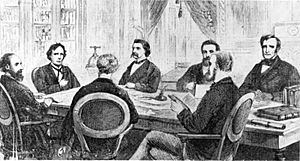
In 1868, Johnson tried to remove his Secretary of War, Edwin M. Stanton. This went against a law that Boutwell had helped write. This action led the House of Representatives to impeach Johnson. Boutwell was chosen as one of the "managers" (prosecutors) for the impeachment trial in the Senate. Even though Johnson was not removed from office, Boutwell played a key role in the process.
U.S. Secretary of the Treasury
In 1869, President Ulysses S. Grant asked Boutwell to be his Secretary of the Treasury. This was a very important job, especially after the Civil War. The Treasury Department was messy and needed fixing.
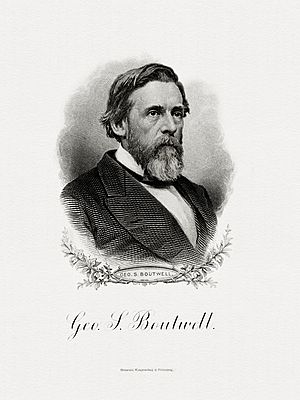
Reforming the Treasury
Boutwell's main goals were to reorganize the Treasury Department and reduce the national debt. He improved how customs houses kept their records. He also brought the United States Mint (where money is made) under the Treasury Department's control.
The Gold Panic of 1869
Boutwell believed the country's money system should be based on gold. He started selling government gold to reduce the amount of paper money (called "greenbacks") in the economy. This lowered gold prices and helped reduce the national debt.
However, two gold traders, Jay Gould and James Fisk, tried to "corner" the gold market. This means they tried to buy up all the gold to control its price. They tried to convince President Grant to stop Boutwell from selling gold.
President Grant eventually realized what was happening. On September 23, 1869, Secretary Boutwell ordered the release of $4 million of government gold. This caused the price of gold to crash, leading to a "Gold Panic." Many traders lost huge amounts of money. A Congressional investigation later cleared both Grant and Boutwell of any wrongdoing.
Reducing the National Debt
Boutwell wanted to use extra government money to pay down the national debt from the Civil War. He set up a plan to sell new bonds at lower interest rates to pay off older, more expensive bonds. This helped save the government money and reduce its debt.
Protecting Rights in the South
Boutwell was still concerned about the violence against African Americans in the South, especially from the Ku Klux Klan. He encouraged President Grant to sign the Ku Klux Klan Act in 1871. This law gave the President power to stop the violence. Grant used this law to arrest and prosecute Klan members in some areas.
U.S. Senator
In 1873, Boutwell became a Senator for Massachusetts. In the Senate, he continued to support a strong currency. He also remained a strong defender of federal protection for Black voters in the South.
He supported the Civil Rights Act of 1875. This law aimed to prevent discrimination in public places. In 1876, Boutwell led a Senate committee to investigate violence in the Mississippi elections of 1875. This violence was designed to stop African Americans from voting. His committee documented the terrible acts that happened.
Later Career and Anti-Imperialism
After leaving the Senate in 1877, Boutwell worked on updating U.S. law books. He also practiced international law, helping the U.S. and other countries with legal claims. He worked for the Kingdom of Hawaii and opposed the U.S. taking over Hawaii.
In the late 1890s, Boutwell became unhappy with President William McKinley's foreign policy. McKinley wanted the U.S. to expand its power overseas. Boutwell left the Republican Party because he opposed the U.S. taking over the Philippines after the Spanish–American War.
He helped start the American Anti-Imperialist League. This group was against American expansion. He campaigned against McKinley in the 1900 election. He continued to support independence for the Philippines until he died.
Death and Legacy
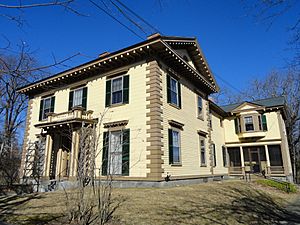
George Boutwell died in Groton, Massachusetts, on February 27, 1905. He is buried in Groton Cemetery. His house in Groton, built when he was governor, is now a museum run by the Groton Historical Society. It is a recognized historic place.
Images for kids
 | Sharif Bey |
 | Hale Woodruff |
 | Richmond Barthé |
 | Purvis Young |


